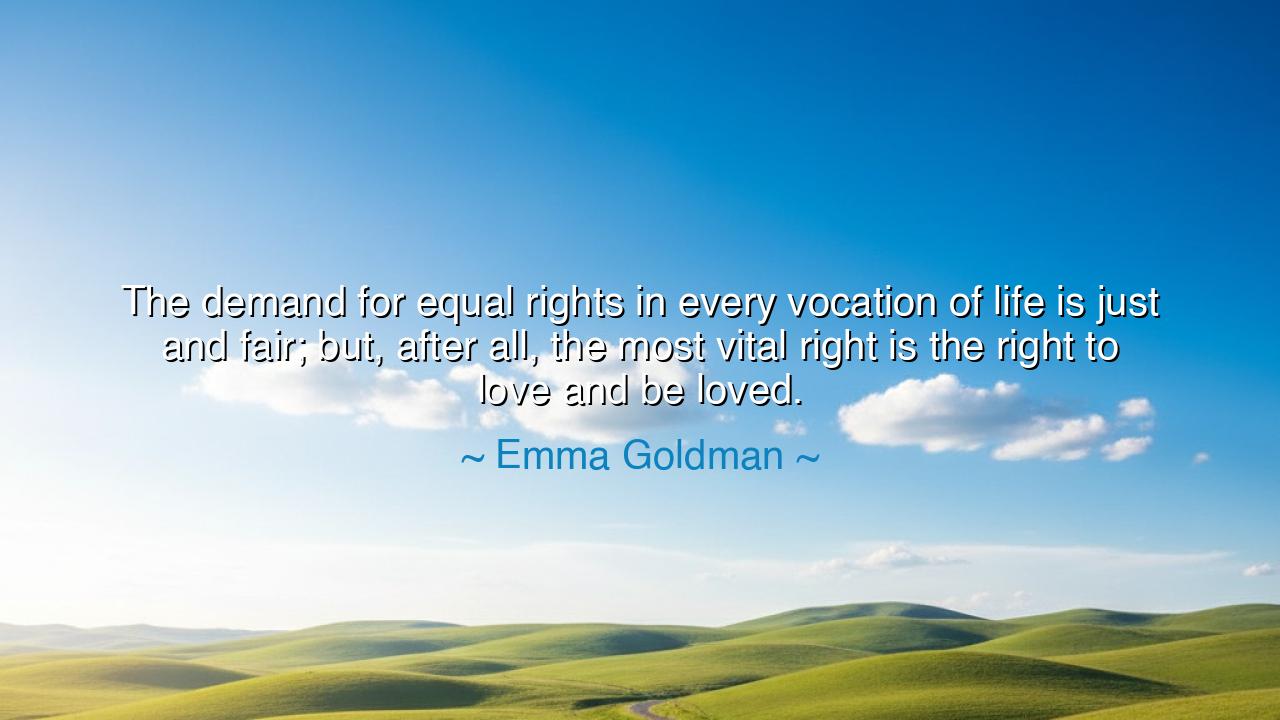
The demand for equal rights in every vocation of life is just and
The demand for equal rights in every vocation of life is just and fair; but, after all, the most vital right is the right to love and be loved.






The fiery words of Emma Goldman, the anarchist and thinker of the early twentieth century, blaze with eternal truth: “The demand for equal rights in every vocation of life is just and fair; but, after all, the most vital right is the right to love and be loved.” Here we hear the voice of one who fought in the streets of injustice, who raised her voice for the oppressed, yet who also knew that beyond politics and labor, beyond laws and institutions, the greatest hunger of the human soul is the hunger for love. She reminds us that while equal rights secure dignity in the world, only love secures wholeness in the heart.
Her words arise from the furnace of her age. Goldman lived in a time of upheaval—workers rising against exploitation, women demanding the vote, immigrants struggling for a place in hostile lands. She stood boldly in the fight for justice, insisting that all should share equally in labor’s fruits, in voice, in opportunity. Yet even amidst such battles, she perceived a deeper truth: that a life filled with rights but devoid of love is a barren life. Rights may guard us from tyranny, but love alone gives meaning to freedom.
History gives us examples that shine upon her words. Consider the story of Mahatma Gandhi. He led millions in the demand for equal rights under British rule. He achieved victories through courage, sacrifice, and nonviolence. Yet Gandhi himself often said that without love—without seeing the oppressor also as a human, without caring even for the enemy—no true liberation could endure. Laws may change, but if hearts remain empty of compassion, the victory is shallow. Goldman and Gandhi, though from different struggles, understood the same truth: the right to love and be loved is the ground from which all justice must grow.
Goldman’s words are also a challenge. For many pursue equality as though it were the summit of human striving. They forget that equality is a framework, not the substance of life. Two people may sit as equals before the law, yet still be strangers, still be cold to one another. In the absence of love, rights protect the body, but they cannot heal the soul. The laws may say, “You are free,” yet the heart may whisper, “You are alone.”
But this is not to diminish the fight for justice—it is to deepen it. Goldman insists that equality is just and fair, but she calls us to remember the goal that lies beyond it: a world where men and women, workers and rulers, neighbors and strangers, all may experience the sacred right to love and to be cherished in return. Without this, equality is only half fulfilled. With it, equality becomes radiant and enduring.
So the lesson is this: in your striving for fairness, do not forget tenderness. Fight for equal pay, for equal dignity, for equal opportunity—these are noble labors. But also fight for the courage to love openly, to forgive, to embrace, to listen. For the right to love is not given by governments or courts; it is claimed by the heart each day. Practice it in your homes, in your friendships, in your work. Give freely of your warmth, and accept it humbly from others.
Practical wisdom follows: when you defend the oppressed, do so not only with reason, but with compassion. When you labor for justice, let it be fueled not by hatred of the enemy, but by love of humanity. And in your personal life, guard against the barrenness of rights without intimacy. Do not settle only for fairness—seek also the fire of connection. For in the end, as Goldman declares, the most vital right is not written in law, but inscribed in the heart: to love and be loved.
Thus, pass down this truth: that the greatest revolution is not only in parliaments or streets, but in the tender bonds we forge with one another. And when generations after us look back, let them not only say, “They fought for equal rights,” but also, “They understood the deeper right—the right to love—and they lived it fully.”






AAdministratorAdministrator
Welcome, honored guests. Please leave a comment, we will respond soon